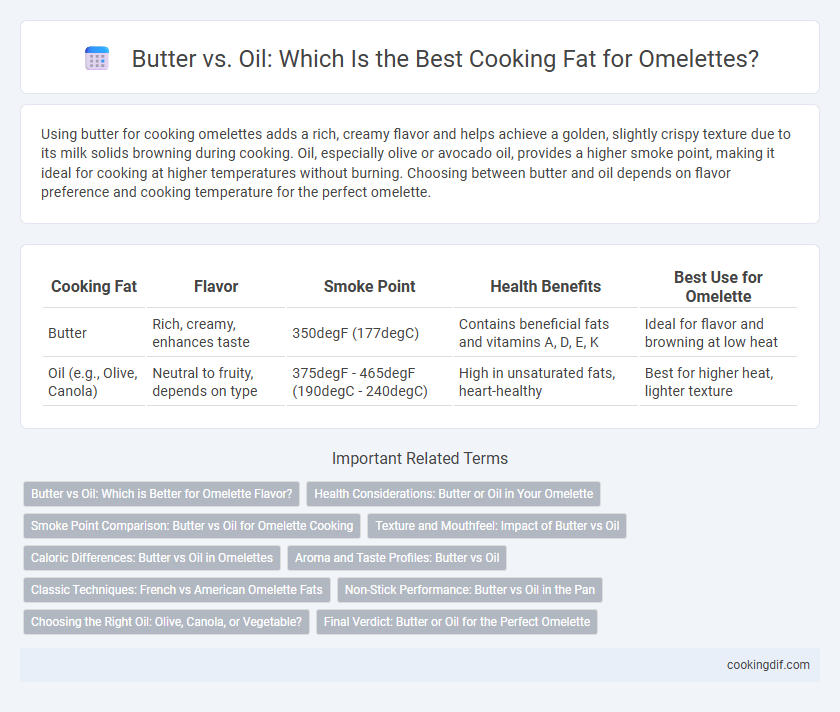Using butter for cooking omelettes adds a rich, creamy flavor and helps achieve a golden, slightly crispy texture due to its milk solids browning during cooking. Oil, especially olive or avocado oil, provides a higher smoke point, making it ideal for cooking at higher temperatures without burning. Choosing between butter and oil depends on flavor preference and cooking temperature for the perfect omelette.
Table of Comparison
| Cooking Fat | Flavor | Smoke Point | Health Benefits | Best Use for Omelette |
|---|---|---|---|---|
| Butter | Rich, creamy, enhances taste | 350degF (177degC) | Contains beneficial fats and vitamins A, D, E, K | Ideal for flavor and browning at low heat |
| Oil (e.g., Olive, Canola) | Neutral to fruity, depends on type | 375degF - 465degF (190degC - 240degC) | High in unsaturated fats, heart-healthy | Best for higher heat, lighter texture |
Butter vs Oil: Which is Better for Omelette Flavor?
Butter enhances omelette flavor with its rich, creamy taste and subtle nuttiness, creating a tender texture and appealing golden color during cooking. Oil, particularly olive or avocado, offers a neutral base, preserving delicate egg flavors without overpowering but lacks butter's depth and aroma. Choosing butter typically yields a more flavorful, aromatic omelette, while oil suits those seeking a lighter, less pronounced fat profile.
Health Considerations: Butter or Oil in Your Omelette
Butter contains saturated fats and cholesterol, which may increase LDL cholesterol levels and cardiovascular risk if consumed excessively, while oils like olive oil and avocado oil provide healthier monounsaturated fats that support heart health. Choosing oils rich in omega-3 fatty acids, such as flaxseed or walnut oil, can enhance the nutritional profile of your omelette by offering anti-inflammatory benefits. For individuals with dairy sensitivities or cholesterol concerns, plant-based oils serve as a heart-friendly alternative to butter without compromising flavor.
Smoke Point Comparison: Butter vs Oil for Omelette Cooking
Butter, with a smoke point around 350degF (175degC), provides rich flavor but can burn quickly, making it less ideal for high-heat omelette cooking. Oils such as canola, vegetable, or avocado boast higher smoke points ranging from 400degF to 520degF (204degC to 271degC), allowing for better heat tolerance and even cooking without burning. Choosing oil helps maintain an optimal cooking temperature, preventing browning or bitterness often caused by butter's lower smoke point.
Texture and Mouthfeel: Impact of Butter vs Oil
Butter imparts a rich, creamy texture to an omelette, creating a smooth and velvety mouthfeel due to its milk solids and natural fats. Oil, especially neutral varieties like canola or vegetable oil, produces a lighter, less creamy texture with a slightly slick mouthfeel. The choice between butter and oil significantly affects the omelette's overall tenderness and richness, influencing its sensory appeal.
Caloric Differences: Butter vs Oil in Omelettes
Butter contains approximately 102 calories per tablespoon, while most cooking oils provide around 120 calories per tablespoon, making butter slightly lower in calories for preparing omelettes. The choice between butter and oil can affect the overall caloric content of the dish, with oil contributing more calories due to its higher fat concentration. Selecting butter can offer a richer flavor with marginally fewer calories, important for those monitoring calorie intake in their omelette recipes.
Aroma and Taste Profiles: Butter vs Oil
Butter imparts a rich, creamy aroma and a slightly nutty flavor that enhances the overall taste of an omelette, creating a more indulgent eating experience. Oil, especially neutral oils like canola or vegetable, offers a milder taste and less pronounced aroma, allowing other ingredients' flavors to stand out. Using butter for cooking omelettes is preferred when seeking a fragrant, buttery finish, while oil suits those looking for a subtle background fat without altering the omelette's original flavor.
Classic Techniques: French vs American Omelette Fats
French omelettes traditionally rely on butter for its creamy flavor and smooth texture, allowing the eggs to cook gently and develop a delicate, tender consistency. American omelettes often use oil or a butter-oil blend to achieve a higher cooking temperature, resulting in a firmer, more robustly browned exterior while maintaining a fluffy interior. The choice of cooking fat directly influences mouthfeel, color, and flavor intensity, defining the distinctive qualities of each regional omelette style.
Non-Stick Performance: Butter vs Oil in the Pan
Butter offers superior non-stick performance for omelette cooking due to its natural milk solids that brown and create a flavorful crust, enhancing the release of the egg from the pan. Oil, especially refined oils like vegetable or canola, provides a higher smoke point but may lack the same non-stick quality, often causing eggs to stick without sufficient coverage. Using clarified butter or combining butter with oil can optimize non-stick performance and prevent burning, ensuring a smooth and easy omelette flip.
Choosing the Right Oil: Olive, Canola, or Vegetable?
Butter enhances omelette flavor with a rich, creamy taste and browns easily but has a lower smoke point, making it prone to burning. Olive oil offers a healthier option with monounsaturated fats and a robust flavor, suitable for medium heat cooking. Canola and vegetable oils provide neutral taste and higher smoke points, ideal for evenly cooking omelettes without overpowering other ingredients.
Final Verdict: Butter or Oil for the Perfect Omelette
Butter provides a rich, creamy flavor and helps achieve a golden, slightly crispy exterior on an omelette, while oil offers a higher smoke point and a lighter taste for those seeking a less rich option. For the perfect omelette, butter is often preferred by chefs due to its ability to enhance flavor and create a tender texture without overpowering the eggs. Using clarified butter can combine the best of both worlds by offering a higher smoke point with buttery taste, ensuring an optimal cooking fat choice.
Butter vs Oil for cooking fat Infographic

 cookingdif.com
cookingdif.com